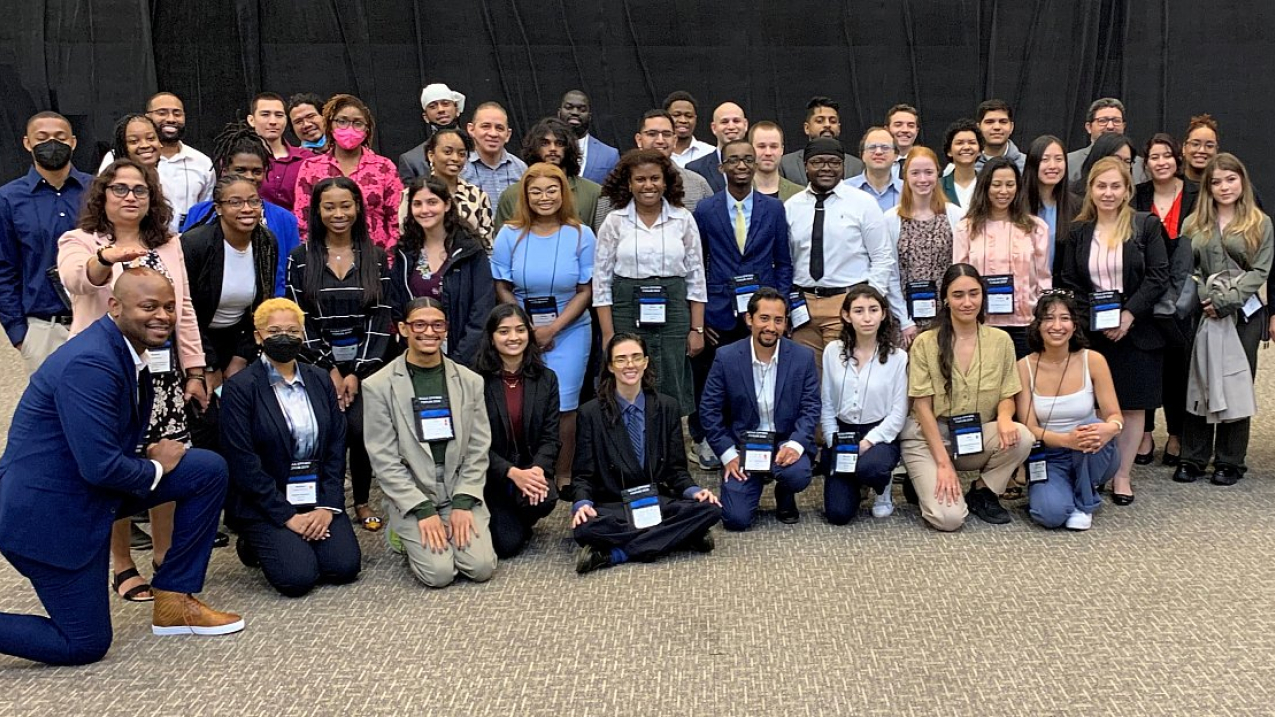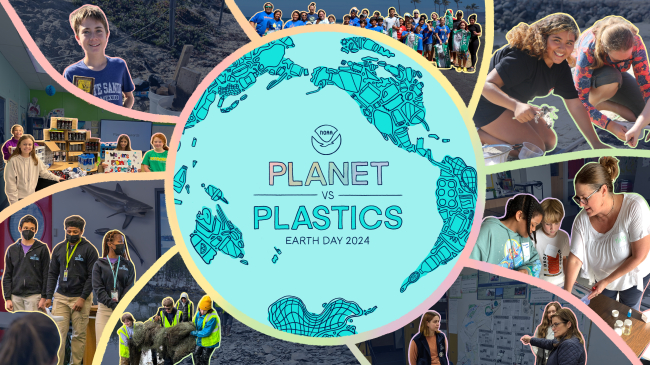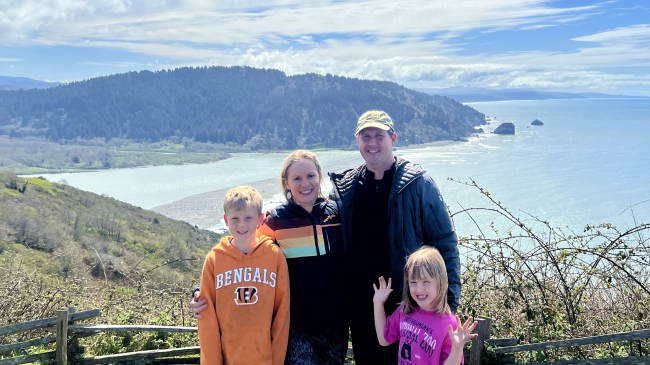The 10th Biennial Education and Science Forum offsite link of the José E. Serrano Educational Partnership Program with Minority Serving Institutions (EPP/MSI) took place April 6-8, 2022. The forum was an opportunity for EPP/MSI-funded students to present their NOAA mission-aligned research and to meet and network with NOAA scientists and subject matter experts.

Participants at the 2022 Educational Partnership Program with Minority Serving Institutions Education and Science Forum. The forum was hosted by Florida Agricultural and Mechanical University, the lead institution for the Center for Coastal and Marine Ecosystems, a NOAA Cooperative Science Center. (Image credit: Courtesy of Florida Agricultural and Mechanical University)
The theme was, “Two Decades of Excellence: Nurturing Future Leaders in STEM.” After listening to students present their NOAA-supported research, Larry Robinson, Ph.D., Principal Investigator of the Center for Coastal and Marine Ecosystems offsite link, concluded during the closing ceremony, “I think our future is in good hands.”
The event was the second installment of a two-part forum that recognized the accomplishments of the EPP/MSI program over the past 20 years. Researchers, principal investigators, and students supported through EPP/MSI Cooperative Science Centers convened for an event centered around research, equity, and academic excellence. The forum was hosted by Florida Agricultural and Mechanical University (FAMU), the lead institution of the Center for Coastal and Marine Ecosystems offsite link, one of the Cooperative Science Centers. Four hundred sixty-three people registered to attend the forum, which took place in a hybrid format with attendees joining in person at FAMU in Tallahassee and online.
Robinson, who is also the President of FAMU, has been a partner in the program since its inception more than 20 years ago. “What a privilege it has been to see the changes this program has made,” he said, referring to the impact the EPP/MSI has made at NOAA, partner universities, and beyond. “There’s nothing like it anywhere.”
NOAA Administrator Rick Spinrad, Ph.D., spoke with the forum participants about the impact of the EPP/MSI and the students he met with recently. “What really impressed me ... was, obviously the quality of the work, but also the relevance to the NOAA mission,” he said. “Every single one of the posters I saw talked to a critical issue at NOAA.”
Dr. Spinrad also highlighted the program’s connection to other priorities at NOAA, including diversity, equity, inclusion, and environmental justice. Dr. Spinrad celebrated the fact that more than 80 EPP/MSI alumni have joined the NOAA workforce. “I’d love to see us increase that [number],” he said.
Louisa Koch, NOAA Director of Education, echoed the hope that more EPP/MSI-trained students will enter the NOAA workforce. “NOAA is delighted with the STEM leadership that has come out of EPP/MSI,” she said. She discussed how the agency and the program are working together toward that goal by expanding opportunities for EPP/MSI-supported students to gain research experience and training with NOAA. This also includes using new direct hire authorities to make it faster and easier for NOAA to hire program alumni.
John Cortinas, Ph.D., Director of NOAA’s Atlantic Oceanographic and Meteorological Laboratory, led an activity that challenged participants to explore the factors that affect offshore wind energy development on the East Coast. This scenario was based on a real question that the Bureau of Ocean Energy Management posed to NOAA earlier this year. With guidance from faculty and NOAA staff, students rose to the challenge, listing the interdisciplinary factors that they believed should influence decisions about this aspect of the blue economy. They considered the many areas of expertise NOAA brings to that discussion from fisheries to weather and also talked about the need to consult with communities to understand their needs and co-develop solutions.
Vankita Brown, Ph.D., Senior Advisor for Equity at NOAA and an EPP/MSI alumna, energized the community of students, academics, and federal researchers around climate and environmental justice. “No community should bear the brunt of environmental injustice,” she said. “I believe that you all have the answers to help us solve this problem.” Students shared their own experiences and observations, culminating in a discussion about how EPP/MSI Cooperative Science Centers can integrate environmental justice into their work.
The forum featured three days days of technical sessions including oral and poster presentations. Students, researchers, and partners presented on topics spanning environmental justice, the blue economy, and building a weather- and climate-ready nation.
“You have impressed me immensely over the last three days,” Natasha White, Ph.D., EPP/MSI Management and Program Analyst, said to the students in attendance. As an alumna of both EPP/MSI and FAMU, White returned to her alma mater to help lead and coordinate the forum. “I am impressed with your grasp of science concepts and your ability to communicate those concepts,” she said to these future STEM leaders who may one day follow in White’s footsteps and join the NOAA workforce.
2022 NOAA EPP/MSI Forum student poster and oral presentations award winners
Outstanding student oral and poster presentations across NOAA mission areas were recognized at the end of the forum.
Oral presentations
Climate Adaptation and Mitigation
- Jennifer Kennedy, University of Maryland
- Fambougouri Diane, Bronx Community College
- Selena Gibson, University of Maryland
Healthy Oceans
- Kelsey Martin, Texas A&M University Corpus Christi
- Joe Day, Jr., Savannah State University
- Nicholas Coleman, University of Maryland Center for Environmental Science
Resilient Coastal Communities and Economies
- Mariana Leon-Perez, Harte Research Institute
- Tahirah Johnson, University of Maryland Eastern Shore
- Marcus Teat, Delaware State University
Weather Ready Nation
- Jessica Chen, CUNY
- Foroozan Arkian, Florida A&M University
- Pamela Lara, University of Texas at El Paso
Poster presentations
Climate Adaptation and Mitigation
- Leanne Cohn, Oregon State University
- Ayo Deas, City University of New York
- Alessandra Zuniga, San Diego State University
Healthy Oceans
- Sena Tay, City University of New York
- Nicholas Coleman, University of Maryland Center for Environmental Science
- Travis Leggett, California State University Monterey Bay
Resilient Coastal Communities and Economies
- Keith Sellers, University of Alaska Southeast
- Andrea Pugh-Kelley, Florida A&M University
- Edward Gniffke, University Texas Rio Grande Valley
Weather Ready Nation
- Ashley Bailey, City University of New York
- Sergio Diaz, University of Maryland, Baltimore County
- Steven Naegele, Pennsylvania State University



